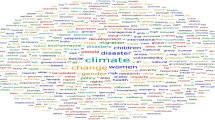Abstract
This paper presents findings on the role of the university and institutional support for climate change education interventions at two universities in East Africa. The findings were part of a larger study on opportunities and challenges for climate change education at universities in the African context: A comparative case study of Makerere University in Uganda and University of Dar es Salaam in Tanzania. A comparative multiple case study design was adopted collecting qualitative data from 58 lecturers, researchers, administrators and students on climate change related programmes at the two universities. Data was collected through semi-structured in-depth interviews and focus group discussions. Analysis was done using thematic analysis based on Braun and Clarke’s (Qualitative Research in Psychology, 3(2), 1–41, 2006) approach with the help of MAXDA software. Findings from the cross-case analysis revealed similarities and differences in perspectives and multiple realities of participants at both universities regarding the role of the university and institutional support for climate change education in the African context. The findings shed light on the context and nature of climate change education interventions and how these are supported at both universities. The study contributes to empirical literature on the role of higher education in addressing climate change and the institutional support to the interventions in the African context.
Similar content being viewed by others
References
Alghamdi, N. (2018). Knowledge and awareness of sustainability in Saudi Arabian public universities. In W. L. Filho (Ed.), Handbook of sustainability science and research, world sustainability series (pp. 103–127). Springer.
Berg, B. L., & Lune, H. (2012). Qualitative research methods for the social sciences (Eighth ed.). Pearson.
Boateng, C. A., & Boateng, S. D. (2015). Tertiary institutions in Ghana curriculum coverage on climate change; implications for climate change awareness. Journal of Education and Practice, 6(12), 99–106.
Braun, V., & Clarke, V. (2006). Using thematic analysis in psychology. Qualitative Research in Psychology, 3(2), 1–41.
Buckland, P., Goodstein, E., Alexander, R., Muchnick, B., Mallia, M. E., Leary, N., et al. (2018). The challenge of coordinated civic climate change education. Journal of Environmental Studies and Sciences, 2018(8), 169–178.
Calzadilla, P. V., Mauger, R., & Plessis, A. D. (2018). Climate change communication in higher education institutions: The case of the North-West University in South Africa. In W. L. F. e. al (Ed.), Handbook of climate change communication (Vol. 3, pp. 241-255). Springer.
Cohen, L., Manion, L., & Morrison, K. (2011). Research methods in education. Routledge Taylor and Francis Group.
Filho, W. L. (Ed.). (2015). Handbook of climate change adaptation (2015th ed.). Springer.
Filho, W. L., Emblen-Perry, K., Hill, P. M., Mifsud, M., Verhoef, L., Azeiteiro, U. M., et al. (2019). Implementing innovation on environmental sustainability at universities around the world. Sustainability, 11(14), 3807.
Flick, U. (2009). An introduction to qualitative research. Sage.
IPCC. (2014). Climate change 2014: Synthesis report. Contribution of working groups I, II and III to the fifth assessment report of the intergovernmental panel on climate change retrieved from Geneva, Switzerland.
Kvale, S. (2007). Doing interviews. Sage.
Lotz-Sisitka, H. (2010). Climate injustice: How should education respond? In F. Kagawa & D. Selby (Eds.), Education and climate change: Living and learning in interesting times (pp. 71–88). Routledge.
Narksompong, J., & Limjirakan, S. (2015). Youth participation in climate change for sustainable engagement. Review of European, Comparative & International Environmental Law, 24(2), 171–181.
Nussbaum, E. M., Owens, M. C., Sinatra, G. M., Rehmat, A. P., Cordova, J. R., Ahmad, S., et al. (2015). Losing the Lake: Simulations to promote gains in student knowledge and interest about climate change. International Journal of Environment & Science Education, 10(6), 789–811.
O'Keeffe, P. (2016). The role of Ethiopia's public universities in achieving the United Nations sustainable goals. International Review of Education, 62, 791–813.
Patton, M. Q. (2015). Qualitative Research & Evaluation Methods (4th ed.). Sage.
Polkinghorne, D. E. (2010). Qualitative research. In J. Thomas & M. Hersen (Eds.), Handbook of clinical Pyschology competencies (pp. 425–456). Springer.
Reza, M. I. (2016). Sustainability in higher education: Perspectives of Malaysian higher education system. SAGE Open, 1–9.
Ssekamatte, D. (2020). Towards a theoretical model linking university education to climate change interventions in the African context. Journal of African Studies and Development, 12(1), 17–24.
UN. (2015). The Paris agreement under the United Nations framework convention on climate change. United Nations.
UNESCO. (2015). Putting climate change education into practice. United Nations Educational Scientific and Cultural Organization.
Vale, P. M. (2016). The changing climate of climate change economics. Ecological Economics, 121(1), 12–19.
Virtenen, A. (2010). Learning for climate responsibility: Via consciousness to action. In W. L. Filho (Ed.), Universities and climate change (pp. 231–240). Springer.
Wilkinson, S. (2009). Focus group research. In D. Silverman (Ed.), Qualitative research: Theory, method and practice (pp. 177–199). Sage.
Yin, R. K. (2009). Case study research design and methods (4th ed.). Sage.
Yin, R. K. (2012). Application of case study research (3rd ed.). Sage.
Author information
Authors and Affiliations
Corresponding author
Ethics declarations
Conflict of interest
The author declares that there is no conflict of interest.
Additional information
Publisher’s note
Springer Nature remains neutral with regard to jurisdictional claims in published maps and institutional affiliations.
Rights and permissions
About this article
Cite this article
Ssekamatte, D. The role of the university and institutional support for climate change education interventions at two African universities. High Educ 85, 187–201 (2023). https://doi.org/10.1007/s10734-022-00828-6
Accepted:
Published:
Issue Date:
DOI: https://doi.org/10.1007/s10734-022-00828-6




